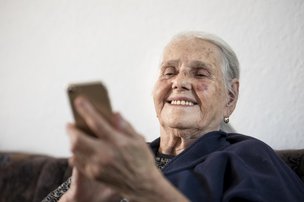A diagnosis of dementia does not have to mean the end of independence. In this article we will explore the use of technology in dementia care, including potential drawbacks and associated costs.
What sort of things can technology assist with?
When considering what technologies may be helpful in the care of an individual with dementia it is important to have a clear understanding of their care needs. Do they need support communicating? Are they relatively independent but require reminding to take their medication?
Below you will see that the various technologies available have been split out into the type of support they provide, the format & cost.
What's available & how much does it cost?
Communication Aids
1. Talking Mats, App for Desktop/Tablets, £125 one-off fee
'Talking Mats' is an app which has been developed by Speech & Language Therapists and can be downloaded onto a desktop computer or tablet.
The app was created with the ambition of improving the lives of people with communication difficulties by increasing their capacity to communicate effectively about things that matter to them.
In the video to the right you will see how 'Talking Mats' has helped James McKillop, who has seen a deterioration in his verbal communication skills due to vascular dementia continue to communicate effectively with his wife Maureen.
2. Skype, App for Desktop/Tablets, Free

'Skype' is a free telecommunications app which allows people to instant message, call or video chat with other Skype users. The app is easy to use and can be accessed on a desktop, tablet or mobile phone. It has been developed so that people can have group conversations on the app as well as one-to-one conversations.
'Skype' is used by many people who have dementia as it's a great means for them to communicate with friends and family. The video chat facility enables sensory stimulation and has been known to effectively alleviate agitation and feelings of isolation in people with dementia.
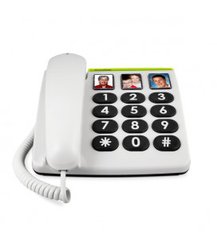
3. Adapted Telephones, From £32.99
Telephones can be adapted to make them easier to use for people with dementia. Some telephones have been pre-programmed so the user can call frequently called people by pressing a button which has a photo of the person on it. Other telephones have been adapted to have large buttons and voice/ringing amplification which are especially useful for people who struggle with their vision or hearing.
Wandering Aids
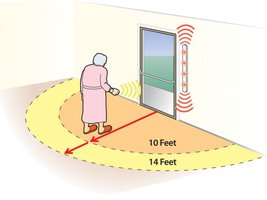
1. Alarm System from £50
Alarm systems can alert certain people when a person with dementia has wandered beyond a certain boundary, for instance their front driveway. Sensor beam alarms often use infra red movement detectors which sound an alarm when the beam is broken by a person approaching.
These alarms can give relatives of the person in question reassurance that their loved one is safe. The only downside to alarm systems is that they cannot be used to locate the exact location of an individual who has wandered beyond a set boundary.
2. Tracking Devices, Key Ring/Smartphone App, From £40
Tracking devices, which use satellite or mobile technology, have been developed so that people can keep an eye on the exact location of a vulnerable person. The devices can vary from key rings and watch-based devices to smartphone apps. They are often a resort for carers or relatives who know someone who is at risk of putting themselves in danger by wandering.
Some tracking devices have a panic button that can be pressed by the person being tracked in situations where they find themselves lost or feel like they are in danger. This will send an alert to the person who is tracking them. The location of the vulnerable person is usually shown on an electronic device such as a mobile phone or desktop.
It can be a huge weight lifted off somebodies shoulders if they know that they can check on their loved ones whereabouts wherever they are at any time of day from their mobile phone.
Memory and Cognition Aids
1. Phone Calendar Prompts, Free
Calendar prompts can be set on a mobile phone to give people alerts at scheduled times. The alerts may set to remind the person to take their medication or to attend a Doctors appointment. Relatives and friends are also able to change and add to their loved ones calendars from their own electronic devices.
A huge advantage of phone calendar prompts is that it helps people who struggle with their memory to keep on track of important tasks and appointments without worrying about forgetting about them. Reminders can either be set for one-off appointments, or they can be set to go off at a certain time everyday.
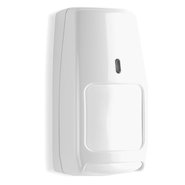
2. Motion Sensors, from £35.99
Motion sensors can be installed around the home. These can be set to give pre-recorded voice prompts when movement is sensed. People may wish to place a motion sensor by their front door so that they are reminded to lock the door when they leave or return to their house.
Medication Aids
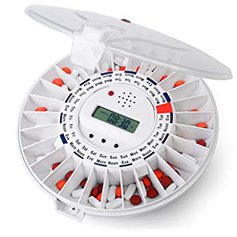
1. Automatic Pill Dispensers, Prices From £13.99
Automatic pill dispensers are very suitable for people who are in the more advanced stages of dementia. The pill dispensers are pre-filled and programmed by a pharmacist or somebody who is close to the individual. Once the pill dispenser has been filled, it is locked. An alarm will then sound at the right time for the pills to be taken. The automated pill dispenser can be set so that friends and family will be alerted if the pills have not been taken.
The benefits of automatic pill dispensers are colossal as they ensure that the person is taking their medication on the right day and at the right time, helps to prevent medication errors, and provides peace of mind to carers and person with dementia.
Safety Aids
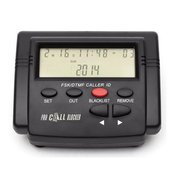
1. Telephone Blockers, Device, From £32.99
Telephone blockers can be used to prevent cold callers. They allow trusted numbers from friends and family to come through, but unwanted calls will not be able to reach your elderly loved one. Some telephone blockers, such as the 'TrueCall Secure', even have a special dementia setting which can provide 100% protection.
A huge benefit of telephone blockers are that they prevent nuisance callers and scammers from being able to take advantage of your loved one who may be in a vulnerable state.
3. Community Alarm, Free (Social Services Provide and install the Alarm)
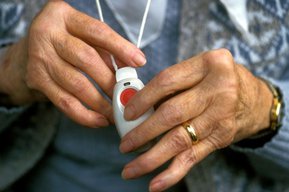
A community alarm is an electronic device that can be connected to your telephone line and is provided by Social Services. The electronic device, which is a pendant, can be worn around the neck or a person's wrist. In the case of an emergency, a button on the pendant can be pressed which will alert the Emergency Response Centre that the person requires urgent help.
The alarm provides people with dementia with reassurance that if they need help or have a medical emergency, all they need to do is press the button on the alarm for assistance. The service is available 24/7 which means that help is always on hand. The alarm can also allow a person to live more independently in their own home as relatives know that they have means to get help in crisis situations.
Are you looking for a dementia care home for your loved one? Please contact one of our Care Advisors who will be happy to assist you!
Call us on 01865 638018
Send message

